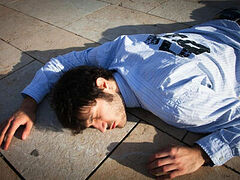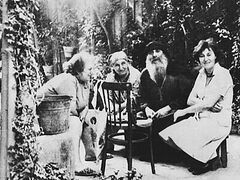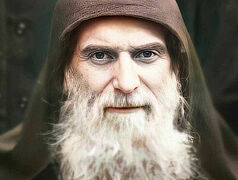The author Tatiana Tsomaya was a spiritual child of St. Gabriel (Urgebadze), a great saint of the twentieth century.
***
 St. Gabriel (Urgebadze) My Church life began in the late 1980s. I was a student then. At that time, most of the youth of my generation were taking their first steps towards Church life at the Sioni Cathedral in Tbilisi, and I would go to the services and molebens there often. I noticed an elderly monk who would periodically come to church there. A murmur would start when he’d appear, and several people would anxiously say, “Fr. Gabriel… Fr. Gabriel…” Batiushka would walk through the crowd to the altar, telling some people to kneel along the way. “Get on your knees and don’t get up till I say so,” the Elder ordered, and the people obeyed unquestioningly. I didn’t pay attention to all of this. According to my stereotypical ideas, a monk should be an educated person, respectable, tall, serious, reserved, laconic; his appearance should speak of his wisdom; he should attract people with his modesty. Elder Gabriel definitely didn’t meet my criteria then.
St. Gabriel (Urgebadze) My Church life began in the late 1980s. I was a student then. At that time, most of the youth of my generation were taking their first steps towards Church life at the Sioni Cathedral in Tbilisi, and I would go to the services and molebens there often. I noticed an elderly monk who would periodically come to church there. A murmur would start when he’d appear, and several people would anxiously say, “Fr. Gabriel… Fr. Gabriel…” Batiushka would walk through the crowd to the altar, telling some people to kneel along the way. “Get on your knees and don’t get up till I say so,” the Elder ordered, and the people obeyed unquestioningly. I didn’t pay attention to all of this. According to my stereotypical ideas, a monk should be an educated person, respectable, tall, serious, reserved, laconic; his appearance should speak of his wisdom; he should attract people with his modesty. Elder Gabriel definitely didn’t meet my criteria then.
Soon I became interested in the monastic life. I started secretly going to Samtavro Monastery, without my parents knowing. I’d tell them my friends had invited me to their dachas or to the village, but in reality, I’d be dashing off to the monastery, spending the days when I could steal away from my parents in this paradise. It was there that I again met this monk who was having people kneel at Sioni Church.
At that time, Elder Gabriel was living both summer and winter in a small wooden room that was more like a chicken coop than a dwelling. I was really surprised and amazed that even in the terrible cold, Elder Gabriel didn’t use the electric range to heat the cell. This is how Batiushka has remained in my memory: He was always dressed in his monastic mantia and girded with a thick belt. I never saw him in dirty clothes, but I don’t remember seeing him in ironed clothes either. His clothes were always worn out. On his chest hung a large crucifix or a large icon of the Savior on a chain, or a large icon of St. Nicholas in a frame.
He was always cheerful, his eyes filled with inexhaustible kindness and ever shining. He was very simple and direct. To this day, I’ve never met such simplicity and directness in anyone else. You felt very free with him—that’s how he drew people to him. You didn’t have to observe any etiquette or keep any distance with the Elder; you could talk about anything. In an instant, he could become very dear and close to you. There was always a special atmosphere around him: No matter how agitated people were when they came to see him, everyone immediately calmed down. I always felt calm, quiet, and somehow protected with him.
When some problems or worries would arise, you’d go to him, tell him about your problems and entreat his prayerful help, and he’d answer: “For your sake, I’ll work like a dog,” or “I’ll climb Mt. Ararat for you, and I’ll roll down from the top and hit Vazgen.”1 We were amused by this, and we didn’t understand what he was telling us. Later I realized that Elder Gabriel really did work for us like a dog; he didn’t have even a moment of peace. He sacrificed himself for us, resisted evil powers for us, and selflessly prayed to God for the sake of our salvation. One time he put his hand up to his ear as if eavesdropping on someone, and said: “This is how the Lord listens to my prayers…”
I remember when one of our spiritual sisters had certain problems, and I would often visit Elder Gabriel to ask him her questions. During one such mission to Elder Gabriel, he was sitting outside his cell with several people. He was already sick then, with fluid in his abdomen. When I arrived, they were draining the fluid. I approached for a blessing and to ask him my spiritual sister’s questions. The Elder attentively listened and started talking about her, advising what to do. I later learned that pumping fluid out of the abdomen is a very painful procedure. And the Elder listened to me and gave advice, as though nothing were happening.
There was this other time, when Elder Gabriel was already very weak physically. It was his last days on earth. But of course, we couldn’t even imagine that he could leave this life so soon, because he had gotten up from his death bed so many times. He was lying on an ottoman in his cell in the ancient tower. We were let in to see him one-at-a-time. I went in, knelt down, asked his blessing, and told him something about my spiritual sister. He answered: “Sister, I can’t talk right now. Tell her that even if I forget everyone, I’ll always remember and pray for her…”
Imagine, a man’s lying on his deathbed, his last hours counting down, and we’re selfishly bothering him with our problems, and despite the pain and infirmity, he’s concerned for us and thinks of us. What is this if not a manifestation of the highest Christian love, if not self-sacrifice for the sake of others? That’s how selflessly Elder Gabriel knew how to love. That’s probably why each of us thought: “He especially loves me…” He would bless us specially, with great love. He would put his hands on our head, say a blessing, and then make the Sign of the Cross over our heads.
He always treated us to something, mostly with candy and fruit, which was our favorite. He never let us go without a meal. I often saw him making soup on a kerosene stove. He’d be talking with us and sprinkling salt into the food by the handful, without even looking at the dish, but he never over-salted, never. Sometimes he would make us coffee himself, ground, with lots of water, but very good. Sometimes he would ask: “Did you bring me the professor?” which is what he called wine or Amaretto. It was very surprising—Batiushka would take a small sip, and then as if very drunk, he’d start singing: “Kakheti wine…” or “Chu-chu-chu, so that no one knew…” Unfortunately, I was one of those who thought the Elder was an alcoholic. He could so masterfully turn into a drunk that just about everyone believed he really was one, especially when he’d start yelling like he was drunk. One time I saw him sitting with some young people, holding a cigarette in his hand like an actor. “Oh, as if that wasn’t enough, he smokes too,” I thought.
One morning I decided to go see him at Samtavro. Along the way, I thought to myself: “He’s a good man in all ways, but it’s too bad that he drinks… He’s a drunkard…” With such a “resolution” I arrived at Samtavro. When I entered the monastery courtyard, Elder Gabriel was standing by his cell. When he saw me, he quickly came down the steps, hugged me, and joyfully said: “My child, I’m a drunk, of course, what else would I be?...”
I never saw him eat, except taking some sugar or honey with his pinky and just tasting it. When we went to see him, he would call his cell attendant Mother Paraskeva: “Paraskeva, lay the table!” And Mother Paraskeva would put out fried potatoes, pasta, soup, and fruit. Elder Gabriel would put food on his plate sometimes, but he never ate it. I remember, one time he said: “One prosphora a day should be enough for a good monk.” “What?!” I thought. “What’s he talking about?!” One time he said in front of me: “So many people are starving now; so many prisoners don’t even have a piece of bread in jail. How can I eat anything?!”
I was visiting Elder Gabriel one time during a fast. He asked some of us to cook some pasta. And we, new believers, started reading the label on the box. “It probably has egg in it, and we’ll be breaking the fast,” we thought. Batiushka looked at us, waited for us to read the ingredients, written in tiny letters, and then said sternly: “Look at them, what they’re doing… Even if the pasta wasn't fasting, I blessed to eat it and they should eat it.”
One time we went to see him during Great Lent. We went into his cell and saw that Mother Paraskeva was cooking hot dogs with Fr. Gabriel’s blessing. We were a little shocked… I mean, it was Great Lent. I really loved hot dogs, but I hadn’t eaten them for a long time. I was so happy that I can’t even explain it. I thought to myself: “They’re making hot dogs. If Elder Gabriel blesses to eat it, I’ll obey. Then he told us that when there’s a blessing, you have to eat, which means, I’ll eat meat, and it won’t count as breaking the fast.” I could hardly wait for my beloved hot dogs to be done and for Batiushka to invite me to eat them. Elder Gabriel looked at me and told Mother Paraskeva, “Well, Sister, let’s treat them with some hot dogs.” He paused, and then continued: “Oh, no… It’s Lent. They’re not allowed. No, Paraskeva, take them away.” Thus did my plan to eat hot dogs in Great Lent collapse.
Elder Gabriel would sometimes rebuke the nuns and guests who came to see him. He could even use abusive words sometimes, seemingly on purpose. He told me once: “They come here and don’t know that I’m testing them. Some get a B, some a C, and some can’t even get a D.”
He tested me pretty thoroughly one time. I was visiting him. He was standing by his tower, cooking pasta. He had matsoni2 and garlic lying next to the pot. He asked me to make him some food. I wasn’t particularly known for my culinary talent, but I had just recently learned how to make pasta with matsoni and garlic, and I really liked it. I was glad to start cooking the dish, and I didn’t even ask the Elder what exactly he wanted. There was no blessing to speak of—I did it my own way. I crushed the garlic and mixed it with the matsoni and cooked the pasta. I was so pleased with myself that it turned out so well, I can’t even put it into words. The Elder’s going to like the food I made. Elder Gabriel waited for me to finish everything, and as soon as I finished cooking and was waiting for some praise from him, he screamed: “What have you done?! Maybe I wanted something different! Maybe I was really hungry! What did you do?!” He took the pot and threw it, barely missing Mother Paraskeva. I immediately understood that he was yelling at me not because he was hungry, but out of grief.3 His eyes gave him away—full of love. He stood next to me. I looked into his eyes and saw that he didn’t want to act this way with me. Have you ever seen the eyes of a shy little child?! That’s exactly how his were. I apologized, realizing that I had shown self-will, vanity, and pride. When I went to see him a few days later, he hugged me and pressed me to his chest. “I didn’t think you’d come see me again,” Batiushka said.
Sometimes my friends and I would stay at Elder Gabriel’s house in Tbilisi, where he had erected a church with his own hands. During that period, the Patriarch had blessed to read prayers seven times a day at certain hours. Once we were sitting at Elder Gabriel’s and the time of prayer was approaching. “Well, let’s pray,” Elder Gabriel said. My friend and I stood in front and began reading the Lord’s Prayer and the appointed psalm and troparion. When we finished praying, we noticed that Elder Gabriel was standing in the corner, humbly bowing his head and listening to us. He was very humble, very meek. And what a chance we missed—to hear him pray!
Elder Gabriel was physically completely different—unearthly, impressive. He was a native Tbilisian. His words had power. His movements and his mannerism were theatrical, artistic. He contained both an extraordinary simplicity and a kind of aristocracy. It’s impossible to describe all this in words. Despite the fact that I’d known Elder Gabriel for a long time, somehow, being near him, I saw him completely differently. I sensed that before me stood a very wise man, possessed of colossal strength. I was very frightened. Once he said: “A clairvoyant is not someone who can prophecy the future, but someone who can save a man from trouble.” It was precisely this quality that drew me to the Elder. He had a special feeling of compassion, love for others, and could sense even the slightest twinge of emotion in you. “You don’t know yourself the way I know you. There’s a mirror behind you—I see you in this mirror,” Elder Gabriel would say. Of course, Batiushka meant something else by “mirror.”
Sometimes Fr. Gabriel would suddenly say: “The Holy Spirit is here now…” Sometimes he would ask us to leave his cell and leave him alone. Then he would invite us in again. He always, always spoke with us about love and unity. He’d look at us and say: “What kind of people are we?” or “What kind of people are our brothers and sisters?”
He could read the thoughts of men. If we had some vain, proud thoughts, then Batiushka would say: “He’s on his high horse now, but soon he’ll be thrown from it…” Sometimes he would unexpectedly ask us: “Why are you sitting, like a saint? What, are you a saint?” We’d immediately start saying in chorus:
“No, Mama4 Gabrieli, we’re sinners…”
“Ahh, well if you’re a sinner, that means you’re my brother. Come, sit next to me,” the Elder would say.
There’s a lot I could say about this amazing man—this saint of our times. There’s much that he said to me. Unfortunately, much has been forgotten, and some of his words were misunderstood. Sometimes Father would say: “This is a miracle of miracles that amazes me: A cow eats green grass and gives white milk…” And I’m also amazed that the Lord allowed me to meet such a man in this life.



